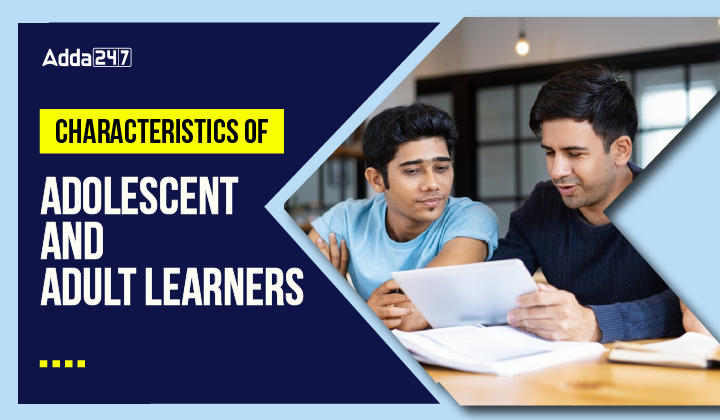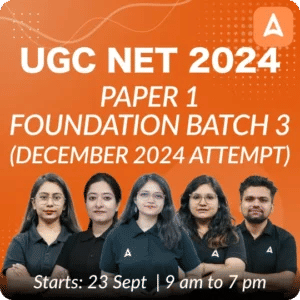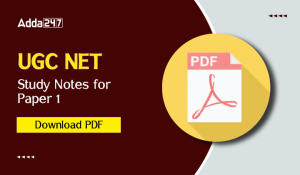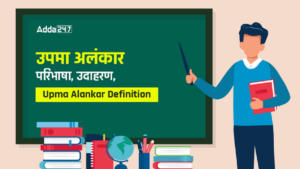Table of Contents
Learning refers to the process by which individuals, particularly children, acquire new knowledge, skills, attitudes, and behaviours. In the context of government teaching exams such as UGC, TET and others, understanding learning in Teaching is crucial for aspiring teachers to effectively plan and implement pedagogical strategies that cater to the diverse learning needs of children. In the following article, we will discuss the distinctive characteristics of adolescent and adult learners.
What is Learning?
Learning is an activity through which a permanent change in behaviour can be with experience and practice.
- According to Bernard, “learning is a process by which an organism satisfies the motivation to adopt or adjust to situations in which it must modify its behaviour to overcome obstacles.”
- According to Walker, “Learning includes a permanent relative change in performance that occur as a result of experience and is not attributable to maturation, fatigue or motivation.”
- According to Gardner Murphy, “Learning covers every modification in behaviour to meet environmental requirements.”
Learners and Types of Learners
A person who is engaged in the process of learning is called a learner; it can be a student trainee or an apprentice. They are engaged in learning skills and abilities. The learners can be categorised into three categories:
Young learners and their characteristics:
Learners falling in the age group of 3 to 11 or 12 years old are viewed as young learners. Young learners exhibit different physical, psychological, social, emotional, conceptual and cognitive aspects. Characteristics of young learners are:
- They learn by imitating and mimicking what they have heard.
- They are skilful in listening accurately.
- They have limited knowledge of the outside world.
- They want to learn through play.
- They have confined writing and reading skills.
Adolescent learners and their characteristics:
Adolescent learners are learners that fall between the age of 10 to 19 years. These are the learners who are leading towards adult food. Adolescent learners experience different kinds of development and changes that include physical, intellectual, psychological and social changes. The following are the major characteristics of adolescent learners.
- Academic characteristics: Academic characteristics are mostly related to respondents’ or students’ education type, education level and knowledge. These include aspects like learners’ education, learning goals and prior knowledge.
- At this stage, high achievements can be attained when challenges are accepted.
- Such learners prefer active learning experiences in comparison to passive learning experiences.
- There is a shift from concrete thinking to abstract thinking.
- Adolescent learners become self-reflective. They start interacting with peer groups during the learning activities activities
- Increase capacity in understanding higher-level humans which can be misunderstood as sarcasm.
- Social Characteristics: Social characteristics are related to the learners’ attitude towards a group or individual with respect to the group. They include the process of establishing a sense of identity and a role.
- They believe that their problems and feelings are unique
- Adolescent learners become self-conscious and sensitive towards any criticism they face.
- They always search for a social position among peers
- They start exploring facial and ethnic identity and look for the same-peer groups having the same background.
- They believe in fads and are interested in popular trends going on.
- Emotional characteristics: Emotional characteristics are related to how the person thinks or feels about themself and others. They include thought and emotional development aspects related to learners.
- Mood swings are at their peak at this stage
- They need some activity to release their energy.
- Self-consciousness at this level increases
- Overreacting to any rejection.
- They need the approval and attention of others and their groups about their behaviour.
- To become independent and to have separate identities.
- There is a concern for physical growth and the majority
- Cognitive characteristics: These characteristics of learners involve cognitive processes like thought, rationale and perception. These majorly include memory, mental pressure, problem-solving skills, intellectual skills, organisational skills and information storage ability of the brain.
- Adolescent learners are influenced by adult role models.
- They rely on their parents and a few adults for advice but mostly they make their decisions on their own.
- Their judgement is quick but many times they come to a faulty decision.
- They show interest in democracy.
- At this stage, they listen and try to understand the complexity of moral issues, especially cultural and religious.
- They are concerned for the downtrodden and suffering classes like animals and the environment.
Characteristics of Adult Learners:
The learners in the age group of 15 to 35 years are called adult learners. Other various organizations of the world like the Organization for Economic Cooperation and Development (OECD) and UNESCO have referred to adult learners in their papers within the age group of 24 to 65. Adult learners are mature learners who are engaged in the learning process. They are having following characteristics:
- Autonomous and self-directed: Adults are autonomous and will direct their own learning based on their learning goals. Therefore, it is necessary to involve the activity in the learning process and the educators should serve as a facilitator to them.
- Life Experience and Knowledge: the Learners’ life experiences, such as work experience dealing with family affairs and societal roles will influence the learner’s learning process. Adult have their life experience which can be used as a resource in their learning.
- Goal Oriented: Adults participate in literacy class for specific reasons or goals which they want to achieve.
- Relevance Oriented: Adult learners always assess how learning is relevant to their life.
- Practical oriented: Learners want to apply their newly acquired skills immediately in their day-to-day life. Adult learners are more pragmatic as they are motivated to learn new ideas/information which is immediately applicable to their situation and needs. Therefore it is essential to tie up the contents of programs to the application needs of the learners.
- Self Respect: Learner’s existing skills and life experience have to be recognized and respected.
- Adults have more diversity: Due to their age and experience adults always vary from each other in the area of learning. This difference and variety may be used as a good resource for learning.
- Resistance to change: Learning brings certain changes in the attitudes and actions of adults which is not welcome by them as a result of which they resist such change as they feel that change may not be better and the results may not also be favourable.
Conclusion
Hence, it becomes important to understand the characteristics of learners in order to frame the learning process effectively. It can help teachers to use teaching and instructional aids in better ways as per the needs of the learner.
Download Characteristics of Adolescent and Adult Learners Study Notes PDF
The direct link to download the Characteristics of Adolescent and Adult Learners Study Notes PDF has been provided below. Candidate must click on the below link to download Teaching Aptitude Study Notes.
Download Characteristics of Adolescent and Adult Learners Study Notes PDF




 UGC NET Study Notes for Paper 1, Downloa...
UGC NET Study Notes for Paper 1, Downloa...
 समुद्र का पर्य�...
समुद्र का पर्य�...
 उपमा अलंकार: पर�...
उपमा अलंकार: पर�...














